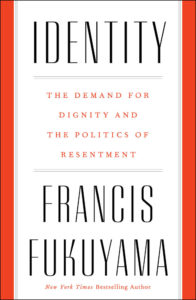 Politics today is defined less by economic or ideological concerns than by questions of identity. All over the world, political leaders have mobilized followers around the idea that their dignity has been affronted and must be restored, argues Francis Fukuyama, the Director of Stanford University’s Center on Democracy, Development, and the Rule of Law.
Politics today is defined less by economic or ideological concerns than by questions of identity. All over the world, political leaders have mobilized followers around the idea that their dignity has been affronted and must be restored, argues Francis Fukuyama, the Director of Stanford University’s Center on Democracy, Development, and the Rule of Law.
That leaves modern liberal democracies facing an important challenge, he writes for Foreign Affairs:
Globalization has brought rapid economic and social change and made these societies far more diverse, creating demands for recognition on the part of groups that were once invisible to mainstream society. These demands have led to a backlash among other groups, which are feeling a loss of status and a sense of displacement. Democratic societies are fracturing into segments based on ever-narrower identities, threatening the possibility of deliberation and collective action by society as a whole. This is a road that leads only to state breakdown and, ultimately, failure. Unless such liberal democracies can work their way back to more universal understandings of human dignity, they will doom themselves—and the world—to continuing conflict.
 “People will never stop thinking about themselves and their societies in identity terms,” adds Fukuyama, a board member of the National Endowment for Democracy. “But people’s identities are neither fixed nor necessarily given by birth. Identity can be used to divide, but it can also be used to unify. That, in the end, will be the remedy for the populist politics of the present.”
“People will never stop thinking about themselves and their societies in identity terms,” adds Fukuyama, a board member of the National Endowment for Democracy. “But people’s identities are neither fixed nor necessarily given by birth. Identity can be used to divide, but it can also be used to unify. That, in the end, will be the remedy for the populist politics of the present.”
This essay is adapted from the forthcoming book, Identity: The Demand for Dignity and the Politics of Resentment (Farrar, Straus and Giroux, 2018).







